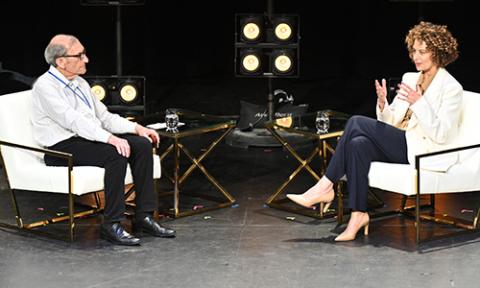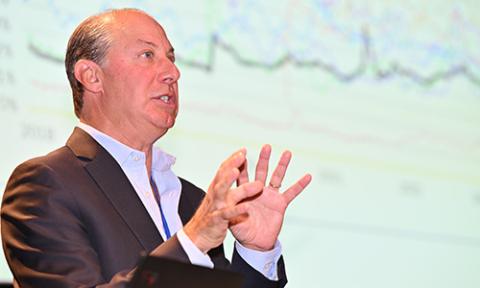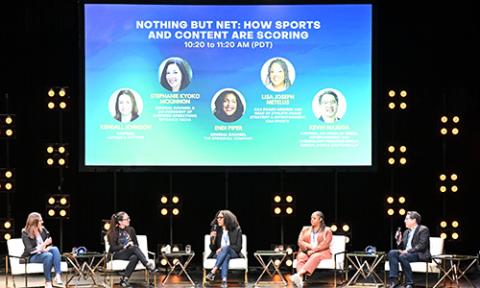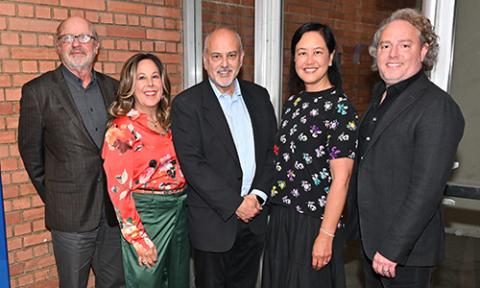48th annual UCLA Entertainment Symposium embraces optimism amid industry challenges

On June 21st, UCLA welcomed to campus over 500 of the entertainment industry’s most influential figures, as industry executives gathered for the 48th annual Entertainment Symposium, hosted by the Ziffren Institute for Media, Entertainment, Technology & Sports Law. This year's theme, “Back to Business: Hollywood’s Dynamic Landscape,” served as a thematic umbrella for a variety of conversations about the industry’s future, with particular focus on rapid technological advances and shifting consumer behaviors.
“We may be back to business, but how do we choose to define that business today, and what will it look like in the next 48 years?” posed Cindy Lin, executive director of the Ziffren Institute, in her opening remarks.
Headlined by Donna Langley, chair of NBCUniversal Studio Group and chief content officer, the symposium brought together industry leaders – from one of the Mattel executives who gambled big on Barbie, to one of Creative Artists Agency’s top athlete brand strategists – to tackle the industry’s hottest topics. Whether exploring the complex legal ethics of AI in entertainment or the ups and downs of theatrical distribution, the experts tended to agree that future hopes rest on an old foundation: the power of human connection.
Donna Langley in the spotlight

Donna Langley sat down with legendary entertainment lawyer Ken Ziffren ’65, who founded the much-heralded law firm Ziffren Brittenham as well as the Ziffren Institute. Their discussion, in the final session of the daylong conference, tied together many of the themes from the day’s panels, including how to get audiences into movie theaters, the future of streaming, the role of AI in the entertainment business, as well as Langley’s personal path to one of the top spots in the entertainment industry.
Prior to taking the helm of NBCUniversal’s films, TV and streaming content strategy last year, Langley spent two decades focused on feature films, involved in blockbusters including Oppenheimer, Jurassic World, The Super Mario Bros Movie, 50 Shades of Grey and Get Out.
Ziffren asked Langley how she decides what content to assign to traditional broadcast TV (such as NBC, Bravo or E!) versus streaming on Peacock. Langley said the decision is usually straightforward, based on the clear age difference between the streaming audience and the linear TV audience. Bravo content, she explained, does well on both platforms, but with minimal audience overlap.
“We are learning as we go,” she admitted. “Something we’re thinking about strategically right now is the idea of starting with a younger audience fanbase and then migrating that over to NBC. Whether it’s possible to age down that broadcast audience remains to be seen.”
On the box office’s failure to bounce back to pre-pandemic attendance levels, Langley showed cautious optimism. She predicted an uptick in the second half of the year, driven by popular franchises and overall increase in volume.
“Consumer behavior has shifted and it’s probably not coming back anytime soon. I’m not going to say never, because it’s all cyclical,” she added.
“One of the things we’re quite optimistic about is [that] Gen Z is a very reliable audience at the box office,” Langley said. “They’re not going to see everything. It’s appointment viewing and it has to have a lot of social energy around it. That audience will just as soon go to Inside Out, Oppenheimer or Barbie or Cocaine Bear or M3GAN. It’s platform- and genre-agnostic, but has to have social energy – something they can interact with others about.”
Langley drew applause with her response about the role of artificial intelligence by saying that first and foremost, “the labor piece of it has to be right.” Although she said the company is not currently using AI to make any movies, she conceded that it’s an inevitable part of the industry’s future.
“It’s a technology just like any tech innovation that the film industry has seen throughout its 100-year history, but it’s moving so much faster.”
Langley called for “good, clever, sophisticated copyright laws around our IP, so we’re not being disadvantaged” as well as the need for freedom to creatively use the technology.
“It should be exciting, but we’ve got to get the ethics of it right,” she concluded.
‘After the Streaming Wars’

The foundation for the symposium’s conversations was laid out in the morning by Michael Nathanson, partner and senior research analyst at MoffettNathanson Research, who dissected the causes of the industry’s recent revenue loss. He pointed to rising inflation that led many consumers to tighten their spending by canceling their cable bundles and switching to streaming services. In just the past five years, 20 million U.S. homes cut the cord, he said. On the corporate side, Nathanson referenced “deflationary corporate strategies,” where companies attracted new subscribers by launching streaming services with rich content and especially low prices – Disney+, HBO Max and Peacock, for example – as well as a shift away from ad spending for TV and toward spending on ad-supported streaming and Internet services.
“As a result of this perfect storm, traditional media companies now realize that they have to adapt to this new world just as new entrants become more aggressive,” said Nathanson.
Consumers are settling into an average of four streaming products per home, according to Nathanson. But there is still a great deal of churn among customers – averaging 5% across the board, except for Netflix, which is the best at less than 2%.
Going forward, Nathanson predicts large-scale mergers and acquisitions, companies exiting the streaming business, an increase in third-party content licenses and a greater focus on sports content – which continues to be a big winner.
‘Nothing But Net – How Sports and Content Are Scoring’

With sports in the spotlight, three experts shared perspectives on the opportunities for content creators and athletes in the session “Nothing but Net – How Sports and Content Are Scoring,” moderated by Latham & Watkins’ Kendall Johnson and Gibson Dunn & Crutcher’s Kevin Masuda, who is also a Ziffren Institute Advisory Board member.
“A lot of the leagues are thinking about how to engage viewership and fans outside of the actual season. That’s where we come in,” said Stephanie Kyoko McKinnon, general counsel at Skydance which produces Hard Knocks: Off Season and NFL Draft: The Pick is In with NFL Films.
The behind-the-scenes content featuring high-profile athletes or rising stars draws attention from sports fans while also bringing in new viewers through compelling characters and stories – which is especially important for attracting a Gen Z audience, explained Endi Piper, general counsel for The SpringHill Company which was founded by LeBron James and Maverick Carter. She went on to explain that athletes are also motivated to participate in documentaries, podcasts, and other platforms outside of their sport because it gives them an opportunity to show the world their authentic selves beyond their athletic prowess.
“They’re doing it because they want to have a voice – a lot of them don’t need the money,” Piper pointed out.
Lisa Joseph Metelus, CAA board member and head of athlete brand strategy & entertainment for CAA Sports, shared her perspective representing athletes who are interested in expanding their influence beyond the court or field. She said brands are capitalizing on the popularity of both sports and personal storytelling.
“Brands are recognizing that storytelling in general goes farther than putting a regular ad on TV,” said Metelus. “Every brand we’re speaking to right now wants to get away from traditional ads,” she says.
‘The Brands Rise Again’

The rise of branded content epitomized by the ubiquity of Barbie was the topic of the panel “The Brands Rise Again!!” Leaders from Mattel, Sony Pictures Entertainment and Warner Bros. Pictures discussed how a brand’s fan base provides a built-in market for movies – whether that brand represent a popular toy, cartoon or famous athlete. So far this year, movies tied to existing brands have included Mean Girls, Dune 2, Kung Fu Panda 4, The Garfield Movie, and Inside Out 2.
“The audiences keep coming back,” explained moderator Michael Helfant ’83, of counsel for Loeb & Loeb LLP. “There’s an emotional connection audiences and consumers have to these brands.”
Mattel worked with 165 licensing partners on Barbie. But turning the world pink required complex agreements, reviews, approvals and timing around embargoed assets. Panelists discussed the book-length style guides that dictate how a brand can be portrayed by licensees, and the delicate dance between creators and those tasked with protecting a brand’s intellectual property.
Josh Silverman, Mattel’s chief franchise officer who worked with director Greta Gerwig on box-office-busting Barbie, says collaboration and trust between creators and brands are the alchemy for successful partnerships. It took a lot of courage for Mattel’s leadership to allow the movie’s marketing narrative to be “whether you love or hate Barbie, this movie is for you,” he said.
Panelists also discussed the pivotal role fans play for brands in generating movie buzz, and the careful balance between fandom and infringement. Eric Baum, SVP business and legal affairs at Sony Pictures Entertainment, explained that Ghostbusters’ cult following – with fans making their own costumes, proton packs and Ecto-1 vehicles – is what enabled the franchise to be reborn more than 30 years after the last film.
“You can’t then squash the enthusiasm for that kind of engagement once the new films come out,” Baum explained.
“Fans are what help drive the box office and the success of our films, so on the marketing side we lean heavily into our fans,” said Jade Alex, executive director of events and global publicity at Warner Bros. Pictures, who has helped promote brand-based films including Barbie and Elvis.
Panelists also acknowledged the post-pandemic growth in location-based entertainment, with Sony launching the indoor theme park Wonderverse near Chicago earlier this year, and Mattel slated to open an Adventure Park in Glendale, Arizona, in 2024.
‘The Good News About Theatrical Distribution’

In May, coverage of the movie industry was all doom and gloom but pivoted to sunshine and roses by June. Paul Dergarabedian, senior media analyst at Comscore, set the tone for the panel on theatrical distribution by contrasting the two months’ headlines. Just like Inside Out, the movie industry is all Anxiety and Depression followed by Joy, he said.
“Those of us who’ve been in industry for 10-plus years understand it ebbs and flows,” said Nikkole Denson-Randolph, senior vice president of content strategy & inclusive programming at AMC Theaters. “We’re going to have good and bad weeks, but we always come out on top.”
The human connection people feel in theaters by sharing an experience is what keeps people coming back, despite the challenges of the past few years. In fact, returning to celebrate old movies remains popular. This year, Shaun of the Dead, Coraline, The Matrix and Neverending Story will all be back in theaters for anniversaries of their original release.
“You can create a cultural moment in a theater,” said Scott Forman, executive vice president & general sales manager at Warner Bros. Pictures, pointing especially to the experience of Taylor Swift fans flooding theaters to sing along and dance to The Eras Tour movie.
The smashing success of Barbie, Oppenheimer and Taylor Swift: The Eras Tour benefited the entire industry, the experts said. “The most important thing is that it means we get to keep making movies,” said Lisa Bunnell, president of distribution at Focus Features. “I think it’s important we give that chance to more voices, younger voices, more diverse voices.”
While the rhythm of releases is still being disrupted by last year’s labor strikes, panelists expect to see greater diversity and options in the theater by the second half of this year – and giving viewers more choices is key to filling seats, Bunnell argued. But at the end of the day, the theater remains a place where people love to go to connect with each other and human stories.
“If the pandemic didn’t do away with theaters,” Dergarabedian concluded, “nothing will.”
‘AI on Screen: Setting the Ethical Standards for Tomorrow's Entertainment’

The ethical and legal implications of using AI in entertainment was the topic of a lively John H. Mitchell Panel on Ethics and Entertainment, moderated by Ilissa Samplin, partner at Gibson, Dunn & Crutcher LLP.
Rijul Gupta, CEO and founder of DeepMedia AI, drew a resounding “no” from panelists and audience members alike when he asked whether there are any fair-use exceptions to train AI models on copyrighted work.
David B. Dreyfus, general counsel for the Directors Guild of America, argued that AI companies should have to license works in order to “feed” them to their models. “We think it should be transparent,” said Dreyfus. “How can these companies ingest the entire internet but not disclose what they ingested?”
Ian Slotin, SVP of intellectual property at NBCUniversal, pointed out that existing laws on using name, image and likeness are technology neutral, and can provide broad protection for creators like Scarlett Johansson, who’s voice was mimicked by an OpenAI product.
“There are gaps, for sure, that need to be addressed, but when we deal with those gaps, what we think about as content creators is making sure there’s breathing room for the first amendment,” said Slotin.
Gupta, whose company detects AI-generated deep fakes, agreed that the speed of change adds complexity. Plus, he pointed out, thoughtful conversations like these are not ubiquitous, and frameworks are needed to protect against those inclined to use the technology to cause harm.
Liz Randall, head of business operations for CAA, said the agency rolled out CAAVault, which aims to help clients secure their digital likeness and voices and allow others to license them – with consent, credit and compensation. She sees this as a vital step in giving artists legal recourse against those who use their digital likeness or voice without consent.
The conversation then turned to AI’s outputs – from still images and short films – and whether those deserve to be copyrightable.
Panelists agreed that while some AI-produced works may not earn copyright protection, on the other end of the spectrum examples like the AI short film Air Head required so much human input that they surely deserve copyright.
“Realistically, where the lines are going to be drawn is going to have to come from the courts,” said Dreyfus. “With new and improved models coming out every week, the technology is moving far too fast.”
The speed of AI advances is just one of the many industry disruptions explored by panelists throughout the day. But if industry leaders are fazed by it, they weren’t showing it at the symposium.
“We have to be believers. We have to be optimists,” Langley said about the viability of broadcast networks. And on campus this past June at least, that optimism prevailed across the entire entertainment ecosystem.
-
J.D. Media, Entertainment and Technology Law & Policy